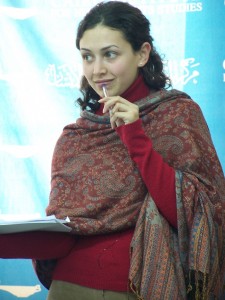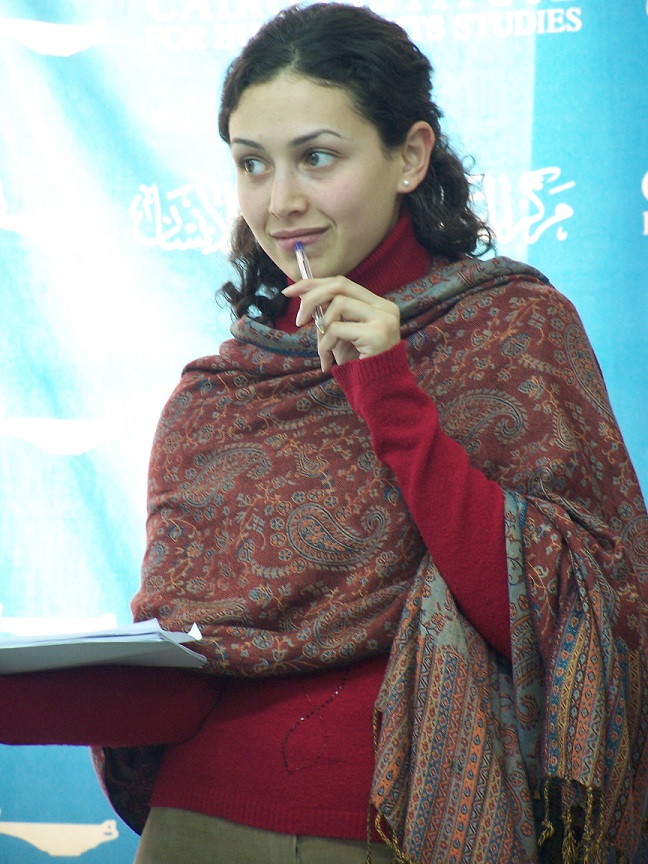 The Cairo Institute for Human Rights Studies wholeheartedly supports Yara Sallam’s nomination for the Front Line Defenders Award for Human Rights Defenders at Risk for 2015. Sallam has been named as a finalist for the international prize. The nomination not only honors her and her efforts, but all those in Egyptian prisons detained on protest charges.
The Cairo Institute for Human Rights Studies wholeheartedly supports Yara Sallam’s nomination for the Front Line Defenders Award for Human Rights Defenders at Risk for 2015. Sallam has been named as a finalist for the international prize. The nomination not only honors her and her efforts, but all those in Egyptian prisons detained on protest charges.
The CIHRS nominated Sallam for the award earlier this year after an appellate court upheld a prison sentence for her and 22 other human rights defenders. According to Front Line Defenders, the award seeks to focus international attention on the work of the human rights defender and the risks they face as a result of their defense of a particular cause. An Egyptian lawyer and rights defender, Sallam has paid the price of two years behind bars for exercising her right to peaceful protest in opposition to the use of the protest law to suppress independent and dissident voices in Egypt and the confiscation of individuals’ rights to express their opinions in peaceful, legitimate form.
Sallam is nominated for the award along Juan Carlos Flores Solìs of Mexico, an environmental rights activist; Diane Marie Rodrìguez Zambrano of Ecuador, a gender rights activist; Guo Feixiong, a Chinese human rights defender who exposes corruption; and Rasul Jafarov of Azerbaijan, a lawyer and the head of the Human Rights Club in his country.
Yara Sallam, 29, is a lawyer and officer on transitional justice at the Egyptian Initiative for Personal Rights (EIPR), as well as the blogger behind Shaghaf. She is also an alumnus of CIHRS training seminars, having attended the 12th student seminar on fundamental human rights principles for students at Egyptian institutes and universities. After receiving a law degree from the Sorbonne in France and Cairo University in Egypt, Sallam began her professional life as a researcher on civil liberties at the EIPR. She then earned an MA in international human rights law at Notre Dame University in the US. She worked as a legal aide in the protection division of the African Commission on Human and Peoples Rights in Gambia, and in 2011 she became the director of the human rights defenders program at Nazra for Feminist Studies. She returned to the EIPR in June 2013, this time as a researcher and officer on transitional justice. The same year, she was awarded the North African Shield, the first defender to win the prize.
On June 21, 2014, Sallam was arrested with 23 other people on charges of demonstrating near the Ittihadiya presidential palace in Cairo’s Heliopolis neighborhood. The demonstration was organized to oppose the Egyptian protest law, which has been recognized by numerous bodies, including the Egyptian government, as repressive and in complete violation of the constitution.
The prosecution charged Sallam and her colleagues with destruction of property, exhibiting a show of force to intimidate passersby and endanger their lives, and participation in an assembly of more than five persons with the objective of threatening the public peace. After more than one postponement of the trial while the defendants were remanded in custody, the Heliopolis Misdemeanor Court on October 26, 2014 sentenced the defendants to three years in prison and a fine of LE10,000 each. The court also fined them for damages and stipulated a three-year term of police probation after release. On appeal, the appellate court revised the sentence to two years in prison and an equivalent term of police probation after release.
On November 24, 2013, the interim President Adli Mansour issued Law 107/2013 regulating demonstrations over the objections of more than 18 rights groups, which urged the president not to approve the bill. The law puts numerous restrictions on citizens’ freedom of public assembly, allowing security forces to be present at such assemblies, purportedly to “secure them.” The law requires demonstration organizers to notify the Interior Ministry of protests seven days in advance, also giving the ministry the right to object to the protest citing expansive, ill-defined grounds.
The CIHRS notes that several irregularities marred the integrity of the trial of Sallam and her co-defendants. Most significantly, the Public Prosecution did not allow the defendants to rebut the evidence brought against them, especially a CD filmed by unknown citizens that shows security forces throwing stones at demonstrators. Neither the first-instance nor the appellate court took action on these depicted events, which constitute a crime under the law. The first trial was also conducted in an Interior Ministry facility, which the defendants’ families were unable to attend.
Moreover, the fact that the trial was moved from its natural venue at the Heliopolis courthouse to the Police Academy contravenes the constitution. The minister of justice decree covering the transfer was issued after the first trial session and was published in the Official Gazette on October 7, 2014, which means the defendants and their counsel had no knowledge of the trial venue.
A group of Arab women judges and lawyers from Bahrain, Tunisia, Kuwait, Palestine, and Morocco sent a letter to Judge Hamed Abdullah, the head of the Egyptian Supreme Judicial Council on September 10, 2014 to express their grave concern over Sallam’s arrest. The signatories to the letter also expressed their strong reservations about the protest law (Law 107/2013).
The prosecution of human rights defenders for exercising their constitutional right to peaceful protest, as well as the use of long-term pretrial detention as a punitive measure and trials characterized by procedural irregularities, has sparked substantial criticism of the Egyptian government in international forums, most recently during Egypt’s Universal Periodic Review before the UN Human Rights Council in November 2014. The Egyptian government faced broad criticism from rights groups and international organizations due to the law, as these groups demanded the release of all prisoners of conscience and victims of the protest law. Egypt is expected to announce its acceptance or rejection of these recommendations on March 20, 2015.
Share this Post

